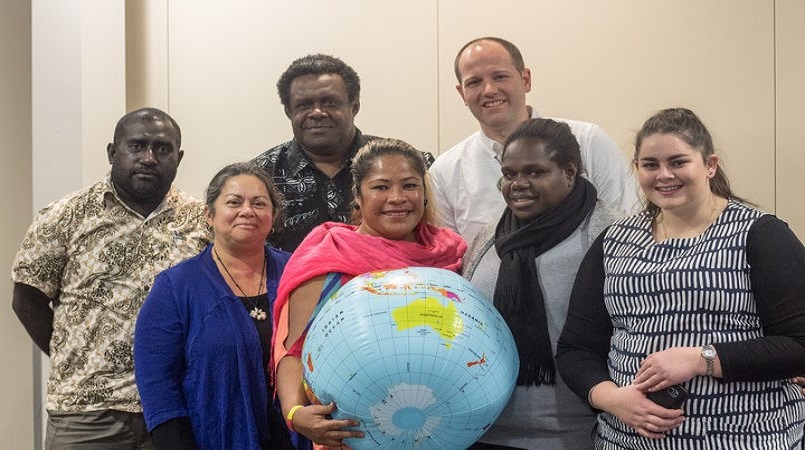
Youth workers from the Pacific say that it's vital young people in the region feel empowered, and included as valued members of society.
A group from the Ola Fou programme was in Wellington last week for the PD Festival - that brought together youth workers from around the world.
The Pacific was represented by youth development workers from Vanuatu, Tonga, Fiji, Papua New Guinea, the Solomon Islands and Kiribati.
Regional manager for Ola Fou Sereki Korocowiri,who is from Fiji, says that youth culture in the Pacific is in a state of change.
"I think if you look at the Pacific there are a lot of similarities. And one issue is that youth culture is in a transition. So we have moved from a very communal, culturally-based structured society, now we are moving into a more globalized world. And the leaders that people are living under at the moment are from the older generation where the shift to globalization hasn't been that fast moving. And they haven't been that fast moving. And they are the leaders, but they are leading a generation that is now exposed."
He says Ola Fou works with young people from the ages of zero to 29, but also with people who are up to the age of 35.
While young people make up a large proportion of the Pacific population, they are often ignored in decision making, Korocowiri says.
"I can speak from an informed position on those that we are working with, and strangely what we've seen with young people is they are wanting to contribute more. They have the energy, one, and now because they're educated they're open to new things."
Mr Korocowiri says that it is important for the future of the Pacific that young people's voices are heard.
"Within the region youth culture has always been this - young people are seen, but not heard. They are utilising the whole aspect energy level of what their whole energy level is, but they're not being consulted on the decisions that will actual affect their future. If we can create young people who are responsible, who understand that becoming responsible, I think we are creating a very safe space for the Pacific islands."
Ola Fou team leader Elisha Paza Pitanoe, who's from the Solomon Islands says that youth issues in the Pacific are complex, and while unemployment and substance abuse are pressing issues, the bigger issue is instilling a sense of pride in young people.
"The main issue that is affecting youth and also something Ola Fou is trying to address is wanting them to be aware of their self-worth, that they are an asset to their families, that they are an asset to their communities and that they positively can contribute something positive back to their communities I guess."
He says that, in the Solomons, the biggest challenge is dealing with young people who have moved from traditional village settings to informal urban areas, known as settlement
"You have the structure of leadership and the structure within the church that provides leadership in the villages, but when you talk about villages it is more unstructured. Because settlements actually gather together or accommodate from people from different islands, different backgrounds, different races, different cultures, different customs."
Mr Pitanoe says that the shared learning at the PD Festival will be used to motivate young people in Pacific countries.
"We believe they can change and we also believe that they have the potential and be able to bring about development in their own lives, development in their families, in their community and it can also impact the nation as a whole."
Akosita Tuakineiaf, who teaches Ola Fou youth workers in Tonga, agrees that giving young people a sense of self-worth is crucial in the Pacific.
She says that in Tonga most of their work is with unemployed young people, and a focus and getting those who had dropped out of school back into education.
She says that a lot of young people are dropping out of school after only their first year of high school.
"If we focus on them getting [them] back to school so that they have a quality and qualified knowledge and education, then we minimise the problems and unemployment."
Ara Taiohi chief executive Anya Satyanand, who helped organised PD festival, says that having the Pacific youth workers at the conference will help those who with young people from Pacific backgrounds in New Zealand.
"We know that our young people who Whakapapa back through the Pacific, who are first generation, second generation, third generation Pasifika people living in Aotearoa - we know that those people have challenges in terms of their growth and development and their ability to take out thriving positions in our community and our society and the wisdom that has been brought over by these youth development though leaders from the Pacific has been amazingly useful and easy for people in New Zealand to understand and bring to their practise when working with people who hold the Pacific in their hearts and minds, but they're growing up here."
Elisha Paza Pitanoe says the Pacific youth workers had a chance to showcase some of the great work they have been doing, and use lessons from other youth workers to further influence their work.
"Us who came from the islands share our stories and our counterparts tell us their stories and within this there are areas that we learn. And as we learn we continue to encourage that motivation that will enable us to front with this area of young people, because we believed in them, we believed that they have potential to bring about development in their own lives, development in their families, in their communities and even it can impact the nation as a whole."
Photo: Supplied/ Jon Huang Youth workers at the PD Festival in Wellington.
